Gain insight into the timeless trading principles from biblical stories, exploring ethics and commerce in a divine context.

Trading in the Bible
In the good book, the act of trading isn't just about exchanging goods; it's a dance of wealth, wisdom, and sometimes, divine intervention. You'll find that from Abraham's negotiations to Jesus' parables on investment, there's a rich tapestry of stories that not only reflect the economic practices of ancient times but also offer insights into ethical trading principles.
As you explore these narratives, you'll uncover how these ancient lessons remain remarkably relevant in today's marketplaces. What's more intriguing is how these stories can influence our modern understanding of commerce and ethics, inviting you to ponder on their application in contemporary trading scenarios.
Key Takeaways
- Ancient trade practices, including barter systems and the introduction of currency, laid the foundations for modern commerce.
- Biblical stories highlight negotiation, diplomacy, and strategic economic planning as essential skills for successful trade.
- The Bible emphasizes ethical trading principles such as honesty, fairness, and social responsibility, offering guidance for contemporary business conduct.
- Lessons from biblical investment and stewardship teachings remain relevant, encouraging active resource management and ethical leadership in commerce today.
The Origins of Biblical Trading
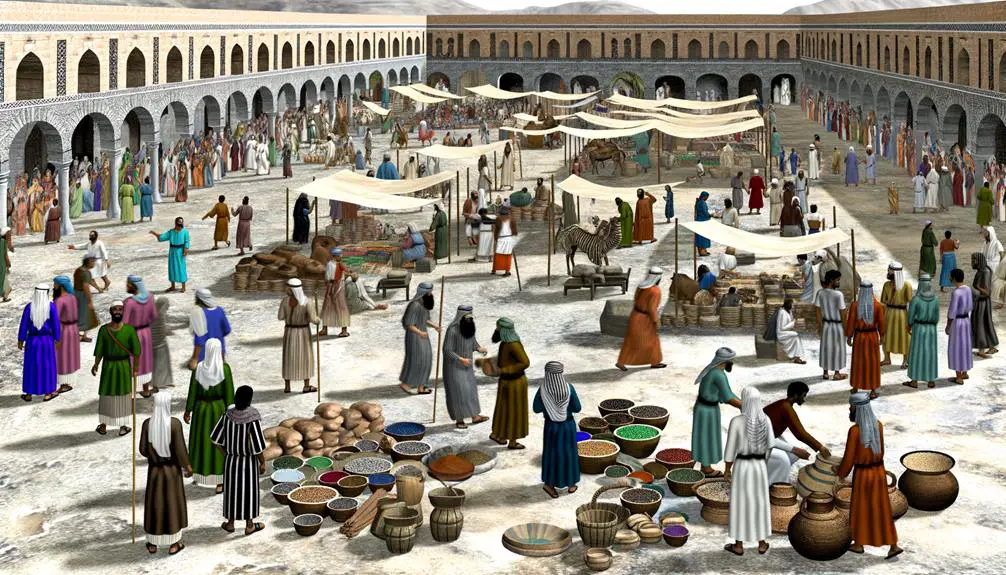
The concept of trade, deeply embedded in the narrative fabric of the Bible, finds its origins in the ancient barter systems and commodity exchanges documented within its texts. This intricate web of trade and commerce wasn't merely incidental but fundamental to the development and sustenance of the societies depicted. You can trace the first rudimentary forms of trade back to the nomadic tribes, who exchanged goods and services out of necessity. However, as these communities settled and civilizations like those in Canaan flourished, trade evolved into a more structured and complex system.
The Canaanite routes, integral to this development, served as the arteries of commerce in the ancient Near East. These paths weren't only physical conduits facilitating the movement of goods but also channels for cultural exchange and interaction. As you delve deeper, you'll find the Phoenician traders, renowned for their maritime prowess, playing a pivotal role in expanding these trade networks. Their ventures across the Mediterranean and beyond weren't just quests for wealth; they were instrumental in the dissemination of knowledge, technology, and religious concepts across vast distances.
Analyzing these ancient trading practices, you'll notice how they laid the groundwork for economic principles that are still relevant today. The Phoenicians, for instance, introduced the concept of a widely accepted currency, simplifying trade and establishing a model that would shape future economic systems. The Bible's portrayal of these early trade practices offers invaluable insights into the socio-economic framework of the ancient world, highlighting the enduring significance of trade in human history.
Abraham's Negotiations

You'll find Abraham's negotiations in the Bible to be a fascinating study in the dynamics of ancient bargaining, particularly in his interactions with God and the rescue deal for Lot.
His approach to bargaining with the divine, as illustrated in these stories, reveals a complex understanding of faith, diplomacy, and negotiation in ancient contexts.
Analyzing these instances not only sheds light on Abraham's character but also on the broader cultural practices of trading and negotiation in biblical times.
Bargaining With God
Abraham's negotiations with God, as detailed in Genesis 18:22-33, exemplify a rare biblical instance of human bargaining with the divine, showcasing a complex interplay of faith, audacity, and reverence. This narrative invites you to ponder the nature of divine-human interactions, evoking parallels to Jacob's ladder and Job's challenge, where humans also engage directly with God.
Unlike the visionary ascent of Jacob or the righteous protestations of Job, Abraham's dialogue is a negotiation for lives, blending plea with persistence. This moment illustrates not just Abraham's deep concern for justice but also a unique form of relationship with God, where questioning and bargaining are permissible within a framework of utmost respect and faith. It's a nuanced dance between mortal boldness and divine patience, enriching our understanding of biblical faith dialogues.
Lot's Rescue Deal
In a pivotal moment within the biblical narrative, God reveals to Abraham the impending destruction of Sodom and Gomorrah, setting the stage for what becomes a profound negotiation over the fate of Lot and the cities' inhabitants. This negotiation highlights Abraham's diplomatic acumen as he engages in a dialogue with the divine, attempting to mitigate the harshness of divine judgment based on the righteous individuals residing within these cities.
Sodom's politics, characterized by widespread corruption and moral decay, contrast sharply with Abraham's ethical stance, underscoring the tension between divine justice and mercy. Angelic intervention plays a critical role in the narrative, as messengers are dispatched to execute God's will, yet they also facilitate Lot's escape, embodying a complex amalgamation of judgment and grace.
This episode exemplifies the intricate interplay between human agency, divine will, and the moral landscapes navigated by biblical figures.
Joseph's Economic Strategies
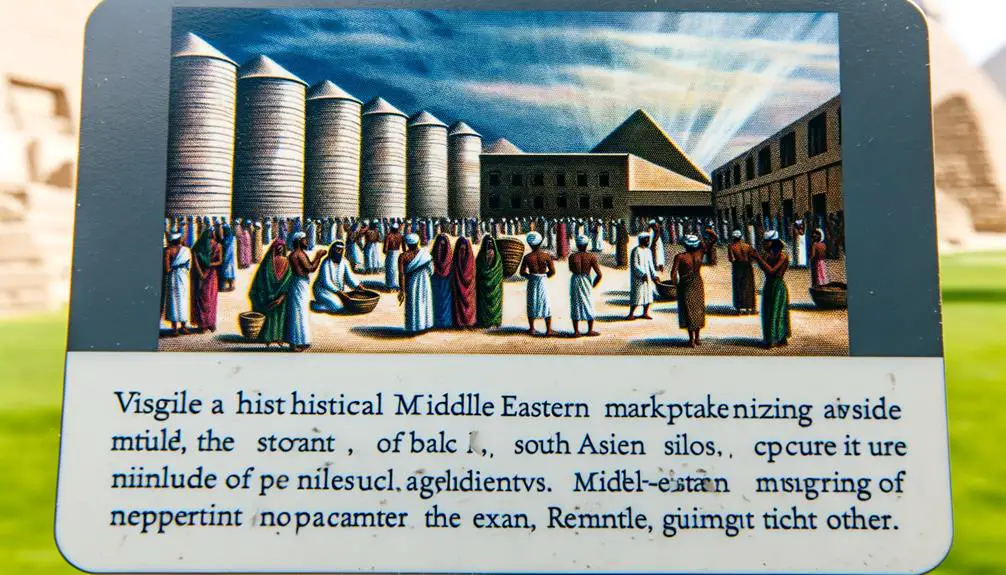
You'll find Joseph's economic strategies in the Biblical narrative both innovative and prophetic, particularly his approach to grain storage wisdom.
His foresight in preparing for famine not only showcases an exceptional understanding of resource management but also highlights his adeptness in trade negotiation tactics.
These strategies not only secured Egypt's prosperity but also positioned Joseph as a pivotal figure in the ancient economic landscape.
Grain Storage Wisdom
Joseph's astute economic strategies, particularly his approach to grain storage during seven years of abundance followed by seven years of famine, offer a timeless model for managing resources effectively. His insights into climate impact on agriculture underscore the importance of adapting agricultural technology for optimal grain preservation.
By systematically collecting a portion of the harvest during the plentiful years, Joseph not only safeguarded Egypt's food supply but also leveraged this foresight into a strategic reserve that mitigated the harsh effects of subsequent scarcity. This methodical accumulation and preservation of grain demonstrates a profound understanding of resource management, emphasizing the critical role of anticipating climatic variations and optimizing agricultural outputs through innovative storage solutions.
Joseph's strategies highlight the intersection of environmental awareness and technological application in sustaining economies through unpredictable climatic shifts.
Foresight in Famine
Through foresight and strategic planning, Joseph adeptly navigated the economic turmoil brought on by seven years of famine, transforming a potential disaster into an opportunity for sustained prosperity.
Strategy |
Impact |
|---|---|
Grain Storage |
Ensured food availability |
Agricultural Innovations |
Improved crop resilience |
Economic Policies |
Stabilized prices, preventing inflation |
Market Diversification |
Enhanced market resilience |
Joseph's implementation of agricultural innovations not only safeguarded the food supply but also advanced farming techniques, contributing to market resilience during adverse conditions. His economic policies, including the strategic release of grain reserves, helped stabilize prices, preventing the hyperinflation that typically accompanies shortages. By diversifying the market, he further bolstered the economy's ability to withstand shocks, laying the groundwork for a recovery that would outlast the famine itself.
Trade Negotiation Tactics
As we delve into the realm of Joseph's economic strategies, it becomes apparent that his trade negotiation tactics were instrumental in securing prosperity for Egypt during a period of unprecedented famine.
You'll notice Joseph's adept understanding of market psychology and cultural influences played a pivotal role. He didn't just store grain; he leveraged scarcity, understanding how people's fear of shortage would drive them to trade more willingly.
His approach wasn't purely transactional; it was deeply rooted in an understanding of human behavior and societal needs. Joseph's tactics showcased an early grasp of psychological pricing and the significance of cultural empathy in negotiations.
His ability to anticipate and react to the market's psychological dynamics, while respecting and utilizing cultural influences, set a foundational example for trade negotiation tactics that are still relevant today.
Moses' Laws on Commerce
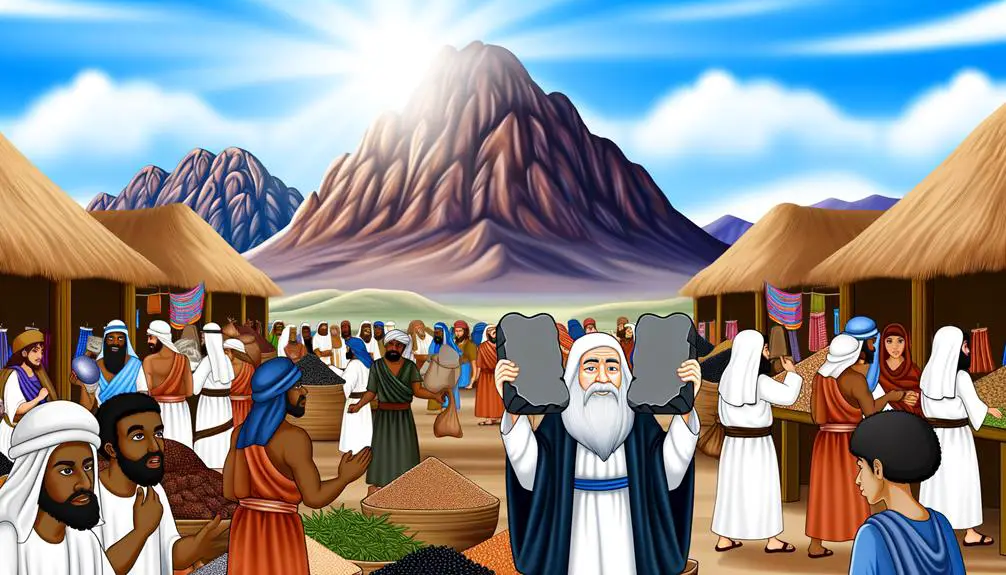
Moses' laws on commerce, detailed within the biblical texts, establish a foundational framework for ethical trade and financial interactions among the Israelites. Central to this framework are the concepts of debt forgiveness and priestly tithes, both of which reflect a profound understanding of economic sustainability and social equity.
Debt forgiveness, as mandated in the Sabbatical year, underscores the importance of economic resets. This law ensured that every seven years, debts were to be forgiven, preventing the accumulation of insurmountable debt and the ensnaring of individuals in perpetual poverty. It's a principle that emphasizes compassion and communal responsibility over strict financial reciprocity, encouraging a society where mutual support trumps individual gain.
Priestly tithes, on the other hand, introduced a system of mandatory contributions to the Levitical priesthood, who'd no land allotment of their own. This system served not only as a means of supporting the religious and social leaders but also as a redistribution mechanism that promoted social welfare. By allocating a portion of the produce and income to the priests, the laws ensured that the spiritual and physical wellbeing of the community were intertwined, fostering a culture of shared prosperity.
Analyzing these laws shows an intricate balance between spiritual values and economic practices. Moses' legislation wasn't merely regulatory; it was visionary, crafting a society where economic actions were deeply embedded with ethical considerations. This biblical approach to commerce offers timeless insights into how economies can be structured around principles of fairness, compassion, and communal well-being, rather than sheer profit maximization.
Solomon's Trade Expansions
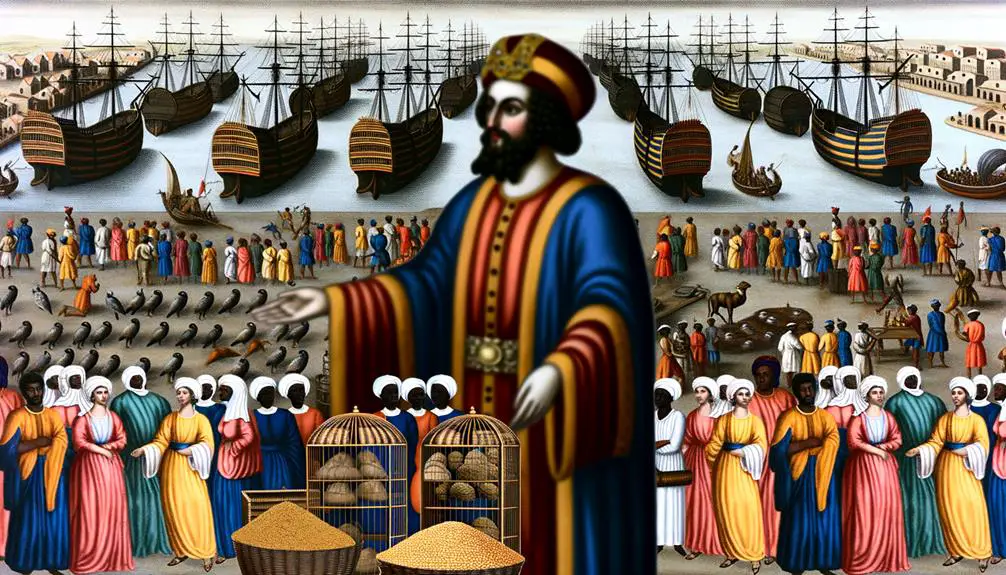
Solomon's reign marked a pivotal expansion in trade, significantly diversifying the economic landscape of ancient Israel through strategic alliances and innovative trade agreements. You'll find that his collaborations, particularly with Hiram, king of Tyre, and the utilization of Phoenician sailors, were instrumental in advancing maritime trade networks. These alliances weren't merely political maneuvers but calculated efforts to enhance the prosperity and reach of Solomon's kingdom.
Under Hiram's alliance, Solomon gained access to skilled Phoenician sailors, renowned for their maritime prowess. This partnership allowed Solomon to tap into the extensive trade routes established by the Phoenicians, connecting Israel to a wider world. The trade wasn't limited to luxury items; it encompassed a range of goods, from cedar wood and precious metals to spices and textiles. This diversification of trade goods contributed to an economic boom, enriching both Solomon's kingdom and its partners.
Moreover, Solomon's strategic use of Israel's geographic location as a land bridge between Africa and Asia facilitated the establishment of overland trade routes. This not only amplified the variety of goods flowing through Israel but also positioned Solomon's kingdom as a central hub in the ancient trade network.
What's particularly noteworthy is how Solomon's trade expansions were intertwined with his other accomplishments, such as the building of the Temple in Jerusalem. The wealth generated through trade was instrumental in funding these grand construction projects, further solidifying his legacy.
In analyzing Solomon's trade expansions, it's clear that his alliances, particularly with the Phoenicians, and innovative approaches to trade were key drivers behind ancient Israel's economic prosperity.
Jesus' Parables on Investment

Jesus' teachings, particularly his parables on investment, offer profound insights into the principles of stewardship and the ethical use of resources. Through these narratives, he not only conveyed messages about the kingdom of heaven but also imparted wisdom on how to manage and invest resources wisely. Analyzing these parables reveals a multi-layered approach to understanding investment, not just in monetary terms but also in spiritual dividends.
Key insights from Jesus' parables on investment include:
- The Parable of the Talents: This story emphasizes the importance of actively using and investing one's gifts and resources, rather than hoarding or hiding them away. It suggests that responsible stewardship and risk-taking in investments are valued, with the master rewarding the servants who increased their talents through active engagement.
- The Parable of the Minas: Similar to the Parable of the Talents, this narrative underscores the expectation of growth and the proactive use of resources entrusted to individuals. It highlights the consequences of inaction and the rewards of diligent investment.
- Investment metaphors: Jesus frequently used metaphors related to agriculture, such as sowing seeds, to illustrate spiritual truths. These metaphors suggest that investing effort and resources into one's spiritual life yields abundant spiritual dividends.
- Ethical implications: While not directly addressing modern financial investment, these parables encourage a broader reflection on ethical investment practices, advocating for wisdom, responsibility, and accountability in the management of resources.
Ethical Trading Principles

Building on the foundational wisdom of Jesus' parables on investment, we now explore ethical trading principles that align with these teachings, emphasizing stewardship, growth, and accountability. You'll find that market ethics and business integrity are not just modern concepts but have deep roots in biblical teachings.
Principle |
Biblical Basis |
Application in Trading |
|---|---|---|
Honesty |
Proverbs 11:1 |
Ensure all transactions are transparent and truthful. |
Fairness |
Leviticus 19:36 |
Treat all parties equally, without exploiting market conditions. |
Responsibility |
Luke 16:10-12 |
Manage resources wisely, avoiding reckless speculation. |
Generosity |
2 Corinthians 9:6 |
Support community welfare through charitable contributions. |
Integrity |
Proverbs 22:1 |
Uphold a good reputation above profits. |
These principles are not merely guidelines but embody the spirit of ethical engagement in the marketplace. Honesty in transactions ensures that you're not misleading or deceiving others for personal gain. Fairness dictates that you consider the welfare of all parties, ensuring that no one is unduly disadvantaged. Responsibility in handling resources prevents wastefulness and promotes sustainability, aligning with the stewardship of earthly resources.
Generosity extends the concept of profit beyond personal gain, encouraging contributions to the community's welfare. Lastly, integrity places the value of a good name above material success, fostering long-term trust and reliability in business relationships.
Adhering to these principles, you're not just complying with market ethics; you're embodying the values of business integrity that transcend time, aligning your trading practices with teachings that have guided ethical conduct for centuries.
Modern Lessons From Ancient Commerce
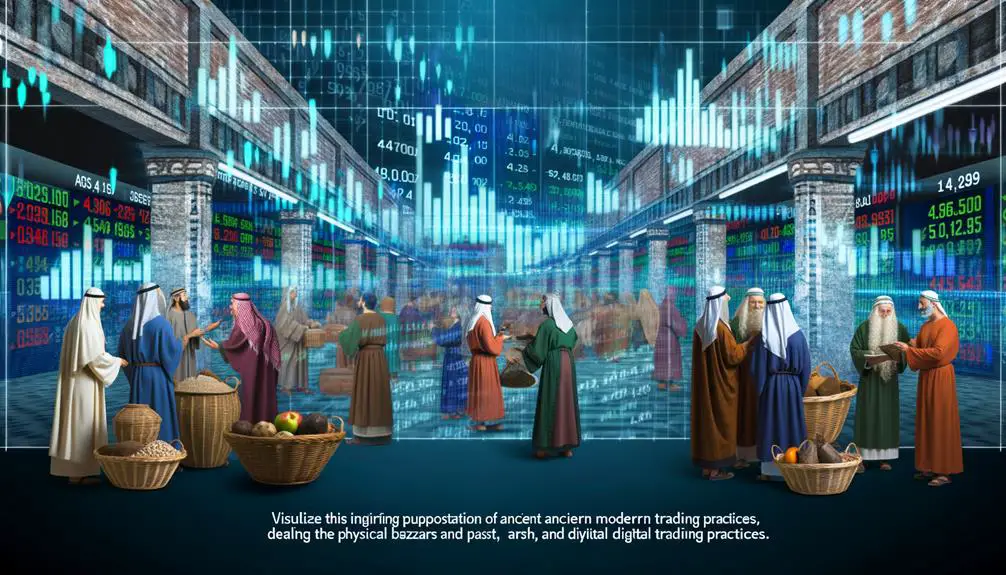
Drawing from ancient commerce, we can discern critical lessons that inform and shape today's trading practices. The narratives and parables intertwined with the commerce of biblical times offer a rich tapestry of insights, emphasizing market morality and the importance of cultural exchange. These ancient stories highlight the foundational role of ethics and mutual respect in business, resonating with contemporary challenges and opportunities in our globalized trading environment.
- Ethical Foundations: Ancient commerce teaches that market morality isn't just an added bonus but a crucial foundation for sustainable trading relationships. It underscores the importance of fairness, honesty, and integrity in every transaction.
- Cultural Exchange as a Value Multiplier: The stories of traders traversing vast deserts and seas in the Bible underscore the value of cultural exchange. They remind us that commerce isn't merely transactional but a vital avenue for sharing ideas, fostering understanding, and enriching societies.
- Adaptability and Innovation: Just as ancient traders adapted to new markets and goods, today's businesses must remain flexible and innovative, embracing change and technological advancements to thrive.
- The Role of Leadership in Commerce: The Bible highlights the importance of visionary and ethical leadership in guiding commerce. Leaders who prioritize the common good, practice empathy, and uphold ethical standards set the tone for their businesses and industries at large.
Analyzing these lessons in today's context, it's clear that the principles of market morality and the enriching potential of cultural exchange are as relevant now as they were millennia ago. They serve as a compass, guiding modern commerce towards practices that aren't only profitable but also equitable and sustainable.
Frequently Asked Questions
How Did Language Barriers Affect Trade Negotiations in Biblical Times, and What Methods Were Used to Overcome Them?
Language barriers significantly impacted trade negotiations, necessitating innovative solutions.
Traders often relied on language interpreters to bridge communication gaps, ensuring accurate exchange of information.
Additionally, gesture communication served as a universal method, allowing participants to convey basic terms and agreements without a common language.
These strategies were crucial in overcoming linguistic hurdles, facilitating smoother transactions, and fostering trade relations among diverse cultures.
Were There Any Notable Women Involved in Trading or Commerce Mentioned in the Bible, and What Roles Did They Play?
You're exploring impactful women in commerce. Proverbs 31 insights reveal a woman of noble character who's a savvy entrepreneur, buying fields and trading goods.
Then there's Lydia, whose entrepreneurship in selling purple cloth highlights her business acumen in a male-dominated society.
Both examples underscore women's significant roles in ancient commerce, reflecting their strategic thinking and financial independence.
Their stories offer a nuanced understanding of gender roles in historical economic contexts.
How Did Biblical Figures Handle the Concept of Currency Fluctuation and Exchange Rates During Trade?
When you're diving into how historical figures dealt with currency fluctuation and exchange rates, it's fascinating to explore their adherence to currency ethics and trade laws.
They navigated these challenges with a mix of wisdom, ethical considerations, and legal frameworks that guided their decisions. Their approach wasn't just about profit but also about fairness and stability in trade, setting a precedent for ethical economic practices that resonate even in today's trading environments.
What Were the Environmental Impacts of Trading Activities Mentioned in the Bible, Such as the Transportation of Goods Across Regions?
You might think ancient trade had little impact on the environment, but that's not quite right. Trading activities, including the transportation of goods across regions, significantly influenced the environment.
Animal domestication played a crucial role, altering landscapes and local ecosystems. Traveling ancient routes for trade also led to the creation and expansion of pathways, affecting natural habitats.
Analyzing these impacts offers a detailed glimpse into the environmental footprint of historical trade practices.
How Did Biblical Teachings Influence the Treatment of Foreign Traders and the Concept of International Trade Relations?
You're exploring how ethical trading and religious diplomacy influenced international trade relations.
The focus here is on how principles, possibly derived from religious or moral teachings, shaped the way communities interacted with foreign traders.
This involves analyzing how ethical norms and religious beliefs might've guided the treatment of outsiders and fostered diplomatic relations across borders.
It's about understanding the impact of ethical and religious considerations on international commerce and the treatment of foreign entities.
Conclusion
In sum, the Bible's narratives on trading, from Abraham's bartering to Jesus' investment parables, underscore a timeless wisdom: ethical commerce can forge prosperity.
Consider Joseph, who, by storing grain during years of plenty, not only saved Egypt but also illustrated the principle of prudent investment—much like a lighthouse guiding ships through treacherous waters.
This ancient wisdom, analyzed through a scholarly lens, reveals that ethical trading principles aren't just historical anecdotes but vital beacons for modern commerce.



Sign up